For this dispensation, ideas are dangerous.
Those who propagate liberalism and democratic traditions are even more dangerous, observes Rashme Sehgal.

Let a hundred flowers bloom may have been Chinese leader Mao Zedong's message to allow intellectuals and artists to express their angst with the Chinese government.
But the present ruling dispensation in Indian believes in crushing secular, liberal, voices which they see as a threat to their immediate implementation of an autocratic State.
It is keeping this over-riding ambition in mind that the Modi government has set about insisting that the Delhi riots which left behind a trial of death and destruction, were the result of a deep-rooted conspiracy triggered by secular intellectuals and students who succeeded in brainwashing the minds of thousands of women encouraging them to sit in protest against the anti-Citizenship (Amendment) Act.
Several student activists including students from the women's collective Pinjra Tod -- Devangana Kalita and Natasha Narwal of Jawaharlal Nehru University and Gulfisha Fathima of Jamia Milia Islamia -- have been arrested and are facing charges under various sections of the stringent Unlawful Activities (Prevention) Act (UAPA), as also student leader Umar Khalid.
What is significant is that from the 20 arrested so far, 19 are students, five of them women.
All of them have been charged under the draconian UAPA and have been imprisoned on charges of a conspiracy for the Delhi violence.
The attention of the Delhi police has now shifted to those they perceive to be the kingpin of this 'deep-rooted conspiracy'.
It is keeping this in mind that the Delhi police has dragged in prominent personalities including Communist Party of India-Marxist General Secretary Sitaram Yechury, renowned economist Professor Jayati Ghosh, Delhi University Professor Apoorvanand, who teaches Hindi at Delhi University, Swaraj Abhiyan leader Yogendra Yadav and documentary film-maker Rahul Roy, all of whom they believe were part of a premediated plan to instigate violence against the State.
Yogendra Yadav is convinced this supplementary chargesheet filed by the Delhi police is but a dress rehearsal.
The main chargesheet against them, he insists, will be filed on September 17.
"By filing this supplementary chargesheet, they were merely testing the waters. They are trying to see what kind of splash this will create? How far it will go? That is why they were ready with the disclaimer statement," says Yadav.
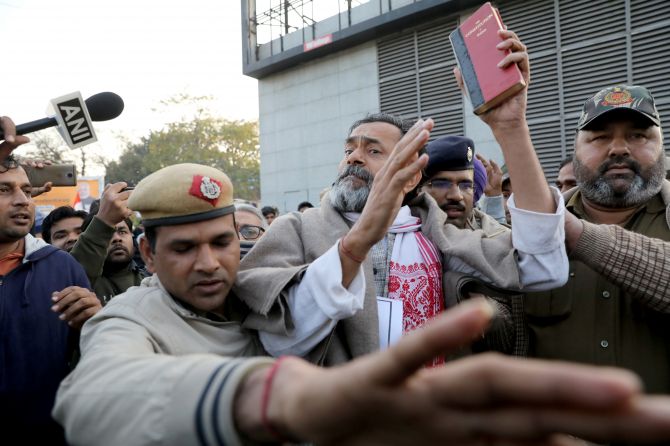
The investigation to the Delhi riots of February is taking place at three levels.
There are 700 local cases which are being dealt with by the local police thanas.
Then there are cases of murder and serious injury which are being investigated by the Delhi police's crime branch and finally, the government believes is the over-arching 'grand conspiracy theory' that has been spun by these secular personalities 'to malign the government'.
It is these instigators who are being brought under the net of the malevolent FIR 59 whereby all the accused will be charged under the dreaded UAPA where the onus is on the accused to prove his innocence.
This chargesheet will, Yadav believes, be filed on September 17. For the present, he said, 'the Delhi police is furiously trying to put together all the dots.'
"The present situation is in many ways worse than the anti-Sikh riots of 1984 perpetuated by the then Congress government because here the government is filing 'criminal cases against the victims," says Yadav.
"And in order to buttress this argument they are deliberately ignoring evidence that is staring them right under their eyes."
"So I believe, the real action will start some time next week," he said.
Tracing the main steps that have led to the unfolding of this diabolical drama, Yadav points out, the home minister (Amit Anilchandra Shah) had issued a statement on February 25 2020 that the violence (Delhi riots) had been a 'spontaneous' act'."
This viewpoint was challenged by a rightwing affiliated report which on February 28 went public to insist the riots were a handiwork of Islamist radicals, backed by 'urban Naxals' who had played a key role in perpetrating this violence under the guise of the anti-CAA protests.
This group of 'urbans Naxals' had misrepresented facts thereby creating disaffection amongst the gullible, uneducated Muslim women who were forced to take to the streets, the report claimed.
"They had arrived at this conclusion even before investigation by the Delhi police had started," points out Yadav.
"Their objective was to criminalise the movement as also to send out a signal that no individual or group should dare indulge in any kind of protests against the government," he says.
"Those who are critical of this regime must pay a price for it. Of course, a lot of people took part in the anti-CAA protests, but they have zeroed in on those who had some visibility," Yadav believes.
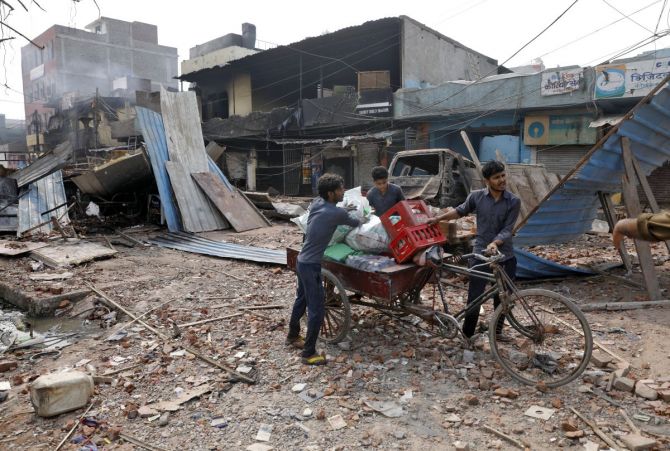
Professor Apoorvanand also points out how the supplementary chargesheet has "accused us of having continously poisoned the minds of common people against the CAA/NRC which is the government's political position," he said.
"Although FIR 50/2020 was registered in connection with the death, from gunshot injury, of one Amaan, the investigation seems to have focussed on deligitimising the protests and in trying to make the protestors indirectly responsible for Amaan's death," Professor Apoorvanand points out.
"While I am not one of the accused, it is very surprising that the police should accuse three young women, without any basis, of having murdered a 17-year-old boy, Amaan," he adds.
"It would seem that the accused women are not directly linked to the murder, but the allegation is that they instigated some unknown shooter."
"The investigation has not revealed who shot at Amaan, but it insists that whoever it was, was instigated by the anti-CAA stance of the accused individuals."
"It is also pertinent that on September 1, the Delhi high court, while hearing a bail application by Devangana Kalita, has categorically held that the police has not been able to give any evidence of any incendiary speech by her."
The court also said that "the statements of the witnesses were produced belatedly, as an afterthought by the police," points out Professor Apoorvanand.
He points out that the names of Rahul Roy, Umar Khalid, Jayati Ghosh, Sitaram Yechury and Yogendra Yadav have been mentioned in uncorroborated statements that are being attributed to the accused who are already in custody.
The police, however, insist that these activists have gone to the extent of informing the police that Professor Ghosh, Professor Apoorvanand and Roy coordinated with the the Islamist group Popular Front of India and the JCC to mentor Pinjra Tod members to carry forward their militant campaign against the CAA.
To corroborate their version, the police produced Fathima's statement which alleges that Yechury, Bhim Army chief Chandrasekhar, Yogendra Yadav, Mahmood Parcha, Umar Khalid and some leaders from the Muslim community assisted the 'conspirators of the violence'.
But the fact is that in the disclosure statements by Natasha Narwal and Devangana Kalita show that both these students have written 'Refuse to sign' and Kalita's statement to this effect was crossed out presumably by the police.
The question is why Professor Jayati Ghosh, a noted economist who teaches at JNU, has been included in this list is surprising especially since she was hardly involved with the anti-CAA protests. The answer is that she has taught economics to both Natasha Narwal and Devangana Kalita.
"My only defence is truth. In my case whatever I say has been recorded and the police will be hard put to produce even one sentence I have spoken which has invoked violence," says Yadav.
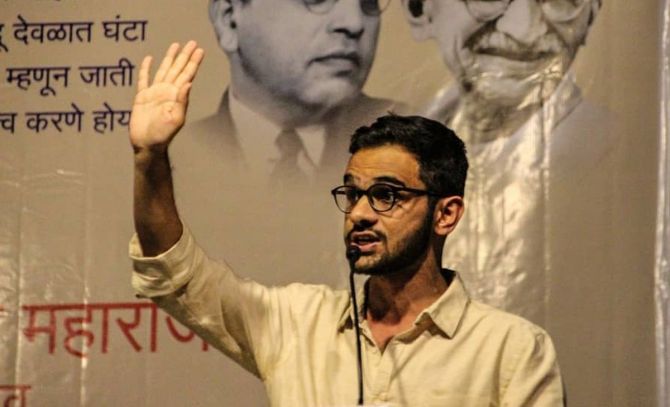
Yechury has also come down heavily against the Delhi police for its 'illegitimate and illegal actions' which he maintains is a direct outcome of the politics of the BJP's top leadership.
'They are scared of legitimate peaceful protests by mainstream political parties and are misusing State power to target the Opposition,' Yechury said going to add that 'BJP's illegal intimidation wont stop people from opposing discriminatory laws like the CAA,' he has tweeted.
The Delhi police's probe may have begun as a regular investigation, but it soon morphed into a witch-hunt against students, activists and academics who have been critical of the Modi government's policies including NRC and cAA.
Professor Apoorvanand believes that the Delhi riots conspiracy case bears an eerie similarity with the Bhima Koregaon case.
In both cases, the actual act of violence has not been investigated nor are the police interested in finding out the facts.
"Their aim seems to be criminalise the anti-CAA protests and protestors. It is a downright scripted investigation," says Professor Apoorvanand.
And indeed the Delhi police has failed to investigate the role of Kapil Mishra and Anurag Thakur in instigating this violence by openly threatening violence if the anti-CAA protestors did not withdraw their protests.
For this dispensation, ideas are dangerous.
Those who propagate liberalism and democratic traditions are even more dangerous.
The media, institutions and the political Opposition are of little concern for them.
It is people like Yadav, Yechury and Apoorvanand who are working on the ground holding onto and propagating Constitutional values who are perceived to be a threat and need to be silenced.
The second Republic of India has dawned and the sooner the public at large resists this onslaught, the better it will be for Indian democracy.
Rashme Sehgal has had a long career in journalism and worked for The Times of India, The Indian Post among other newspapers.
Feature Presentation: Aslam Hunani/Rediff.com

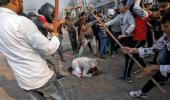
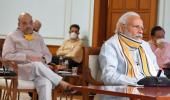
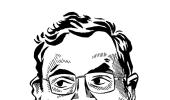







 © 2025
© 2025